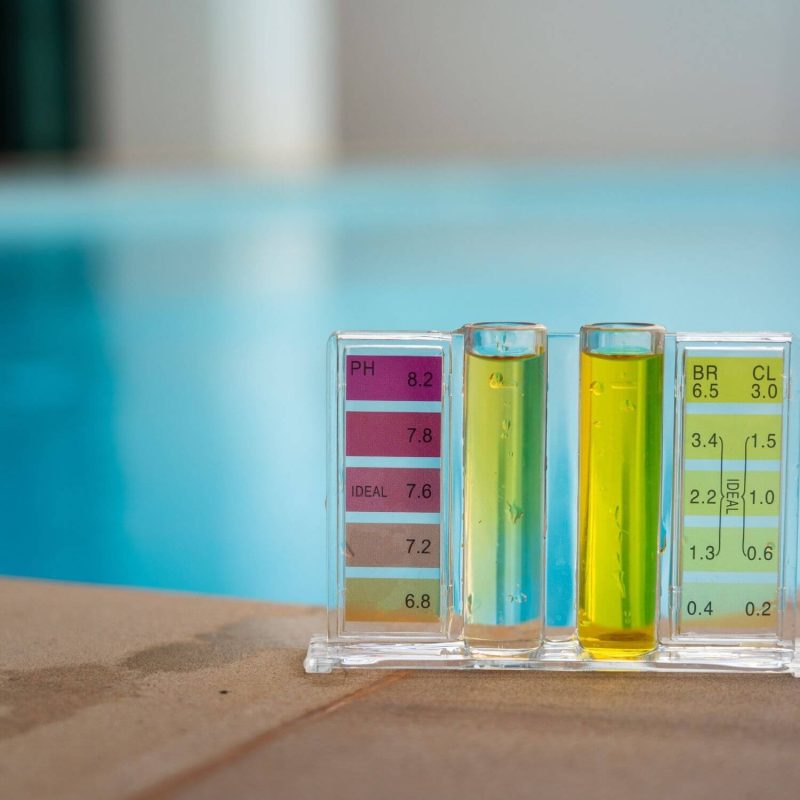POOL MAINTENANCE
- Comprehensive care
- the technical control
- the disinfection and
- the proper maintenance of the pool is of primary importance for its orderly and safe operation.
Our company :
- has a specialized service department made up of experienced professionals in order to cover all your needs.
- takes responsibility for the service of the pool, its cleaning and the repair of its machinery, regardless of whether it has been built by itself.
Through her long experience and having a rich clientele to show for it, the cleaning of the pool is done in such a way that you no longer have reason to worry.
Pool Maintenance
The trusted and specialized staff us in the Service department, the technical control with the appropriate machinery that we have, as well as the cleaning tools combined with the continuous upgrading of our services, ensure you an excellent cooperation with us and free you from problems concerning the cleaning of your pool as well as the maintenance of your pool.
Good pool maintenance is an issue hygiene and should in no case be neglected.
Services we provide you with each pool service visit:
- Checking and adjusting machinery for proper operation.
- Control and regulation of chemical treatment of swimming pool water.
- Supplement pool chemicals as needed.
- Pool cleaning, filter cleaning and repair for any damage that may occur.
Cleaning and Maintenance of the Pool:
- Pool care/wiping
- General cleaning of swimming pool from salts with hydrochloric acid
- Water control and disinfection
The PH of the water is checked with automatic machines and the maintenance is done in a way so that the water does not sting your eyes and does not irritate the skin. The water is disinfected with salt thanks to automatic systems and is a process similar to that of the marine ecosystem resulting in no stinging eyes and no smell of chlorine!

The Team of Pisina Hellas
The Pisinas Hellas team consists of craftsmen with over 20 years of experience. Our company has invested in trust and respect for the customer.
We are by your side to provide you with the best quality services you can find in the pool industry.
Our company is always by your side to give you all the necessary advice for the good operation and proper maintenance of your pool.
FAQ Pool maintenance
Why is pool maintenance important?
Pool maintenance is vital for a number of reasons. First, regular maintenance ensures that pool water is safe and healthy for swimmers. Without proper maintenance, water can become a breeding ground for bacteria, algae and other harmful microorganisms. This can lead to various health problems such as skin infections, ear infections and even respiratory problems.
In addition, pool maintenance helps extend the life of your pool equipment. Regular cleaning and maintenance of the filtration system, pumps and other components ensure that they work efficiently and effectively. Neglecting maintenance can lead to expensive repairs or even the need to completely replace the equipment.
In addition, proper maintenance helps maintain the overall aesthetics of the pool. Regular cleaning and balancing of water chemistry prevent the accumulation of dirt, debris and stains, keeping the pool clean and inviting. This is especially important for pool owners who use their pool for the entertainment of their guests or as a selling point for their property.
Finally, pool maintenance helps optimize pool functionality. Ensuring the correct balance of water chemistry, correct pH levels and adequate water treatment allows for an enjoyable swimming experience. This includes maintaining the proper water temperature, regulating chemical levels, and promptly addressing any necessary repairs.
How often should I maintain my pool?
Regular maintenance of your pool is vital to ensure its cleanliness, longevity and overall functionality. The frequency of pool maintenance depends on several factors, including the type of pool, its size, location, weather conditions and usage. However, as a general guideline, regular pool maintenance on a weekly and monthly basis is recommended.
Weekly maintenance should include tasks such as dusting the surface to remove leaves and debris, brushing the walls and floor to prevent the buildup of algae and other species, vacuuming the pool to remove dirt, and of the smallest particles and the control and regulation of water chemistry levels. It is important to regularly check water pH, chlorine levels, alkalinity and calcium hardness to maintain pool water balance.
Additionally, cleaning the pool filter is a critical part of weekly maintenance. Depending on the type of pool filter (sand, cartridge, or diatomaceous earth), it may need to be backwashed, rinsed, or replaced at regular intervals to ensure proper filtration.
On a monthly basis, more extensive maintenance is recommended. This may include inspecting and cleaning pool equipment such as the pump, heater and splash baskets. Cleaning any debris that may have accumulated in these areas will help maintain their effectiveness and extend their life.
In addition, it is important to regularly check the water level in the pool. If the water level is too low, it can stress the pool equipment, while if it is too high, it can lead to overflow and possible damage.
It is worth mentioning that the above maintenance schedule is a general guideline and that some pools may require more frequent maintenance, especially during periods of heavy use or adverse weather conditions. For example, if your pool is in an area with lots of trees, you may need to increase the frequency of skimming to prevent debris from building up quickly.
What is included in pool maintenance?
Pool maintenance usually involves a number of tasks that are necessary to keep the pool clean, safe and functioning properly. These tasks can be divided into routine maintenance and occasional maintenance.
Routine maintenance tasks include:
-
Surface removal and cleaning: This involves using a removal net to remove leaves, insects and other debris from the surface of the water. Regular scrubbing helps prevent clogging of the pool's filtration system.
-
Vacuum and brush the pool walls and floor: Over time, dirt, algae and other particles can build up on the pool walls and floor. Vacuuming and brushing these surfaces helps keep the pool clean and prevent algae growth.
-
Water Chemistry Control and Regulation: Maintaining proper water chemistry is vital to the health and safety of swimmers. This includes regularly testing the water for pH levels, chlorine levels, alkalinity and calcium hardness. Adjustments may be required to ensure the water is properly balanced.
-
Cleaning and flushing the pool filter: The pool filter is responsible for removing debris and contaminants from the water. Regular cleaning and backwashing of the filter helps maintain its effectiveness and extend its life.
-
Inspection and maintenance of pool equipment: This includes checking the pool pump, heater, valves and other equipment for any signs of damage or malfunction. Regular equipment maintenance and service can help prevent breakdowns and costly repairs.
How can I keep my pool water clean and balanced?
Keeping your pool water clean and balanced is essential to maintaining a healthy and enjoyable swimming environment. Here are some key steps to help you achieve this:
-
Test the water regularly: Use a pool water test kit to measure the chemical levels in your pool. This includes pH, chlorine, alkalinity and calcium hardness. Check the water at least once a week and more often during the hot summer months.
-
Maintain proper pH levels: The optimal pH range for pool water is between 7.2 and 7.8. If the pH is too high, it can lead to cloudy water and scale build-up. If it is too low, it can cause skin and eye irritation. To adjust pH levels, use pH increasers or decreasers according to test results.
-
Ensure Adequate Chlorine Levels: Chlorine is vital for killing bacteria and preventing algae growth in the pool. Aim for chlorine levels of 1-3 parts per million (ppm). You can use chlorine tablets, liquid chlorine, or salt chlorinator to maintain proper chlorine levels.
-
Alkalinity and Calcium Hardness: Alkalinity acts as a regulator for pH levels and calcium hardness prevents water from becoming corrosive. The recommended alkalinity level is between 80 and 120 ppm, while calcium hardness should be kept between 200 and 400 ppm. Use alkalinity increasers or decreasers and calcium hardness regulators to keep them within the desired range.
-
Clean the pool regularly: Remove any debris, leaves or insects from the surface and bottom of the pool. Skim the water using a net and, if necessary, vacuum the pool. Additionally, brush the walls and floor to prevent algae growth and remove any build-up.
-
Maintain proper circulation and filtration: Make sure your pool's circulation and filtration system is working efficiently. Run the pump and filter for at least 8-12 hours per day or as recommended by the manufacturer. This will help keep the water clean by removing impurities and debris.
-
Shock and algaecide treatment: Periodically shock the pool with a high dose of chlorine to flush out any contaminants and restore chlorine levels. Additionally, use algaecides to prevent algae growth. Follow the directions on the products for proper dosage and application.
